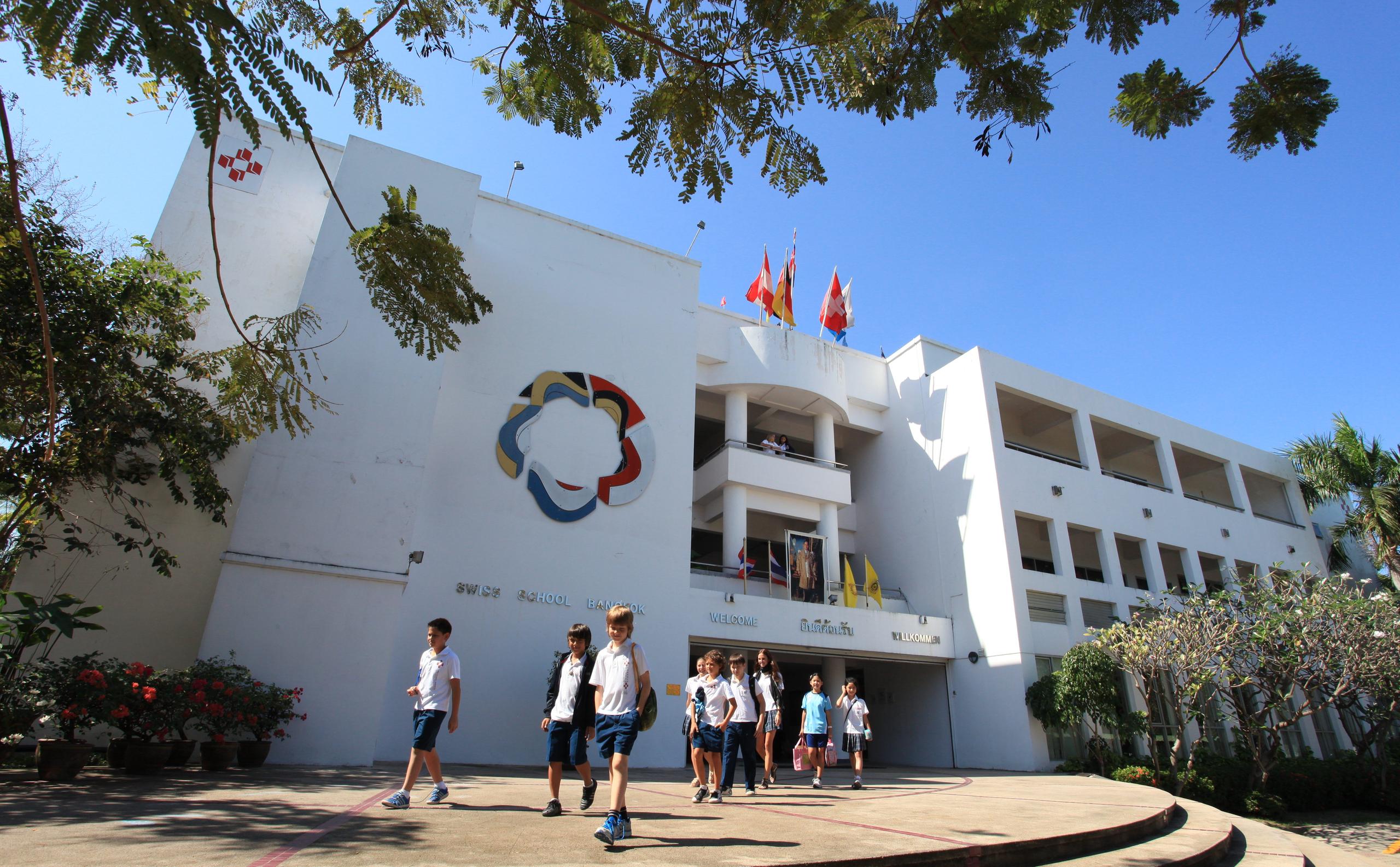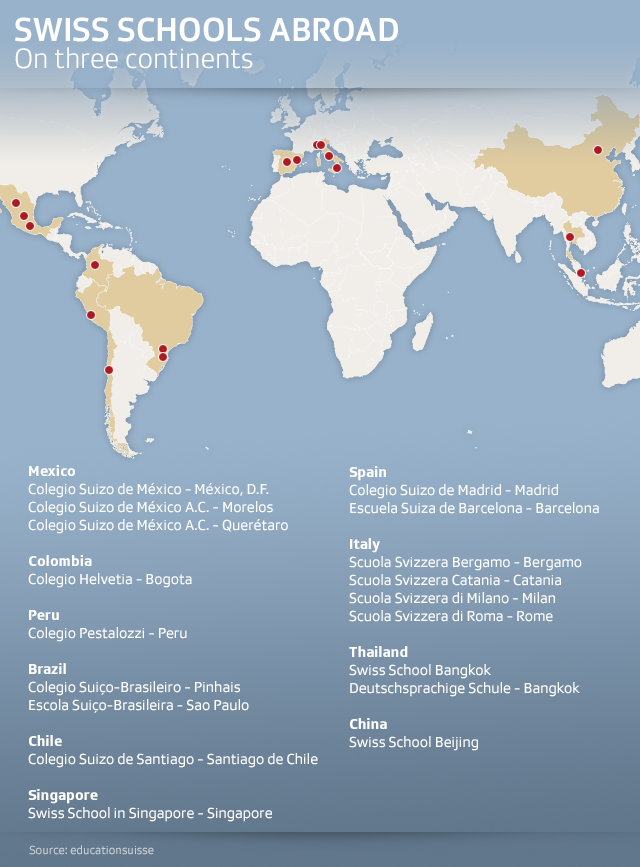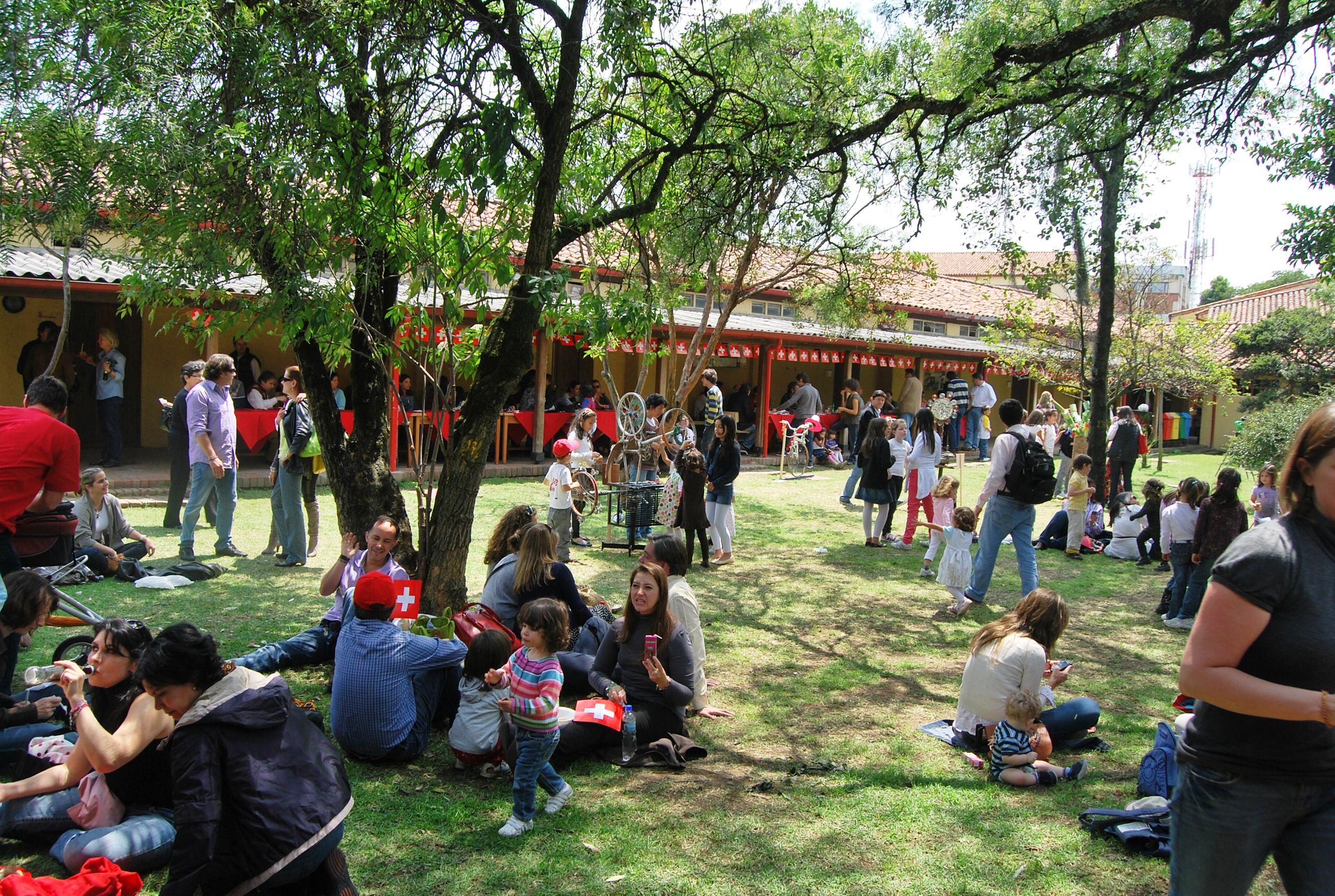
How Swiss schools abroad stand out in a competitive market

Switzerland has a network of 18 schools abroad, all over the world, but not evenly distributed. That’s because the method for creating new Swiss schools differs from that of other countries. There is also a lot of competition.
Most of the Swiss schoolsExternal link abroad are in Italy, Spain or South America.
Asia is covered by Singapore and Thailand, soon to be joined by China when the Swiss School BeijingExternal link opens in August. There is no official Swiss school in the United States.

Why this uneven distribution? It’s because the schools were founded by groups of Swiss abroad in countries where they were especially numerous, explains Barbara Sulzer Smith, director of educationsuisseExternal link, the umbrella association of Swiss schools abroad.
In the post-war years, many Swiss companies opened branches in South America, for example.
“This is unlike the French and German schools abroad system where the government decides where new schools should be founded,” says Sulzer Smith.
She doesn’t know why no one has established a school in the United States, traditionally a country with a high level of Swiss immigration. It could be because people are happy with the school system there, which may not have been the case in other countries, she speculates.
Who can attend?
The Swiss schools abroad are neutral and open to all nationalities, religions and political orientations. But there are two main factors that could limit potential students: language – German is required in higher classes – and the cost of school fees.
There are currently around 7,500 children attending the schools, of which 20-25% are Swiss. The rest are locals (but not in Singapore or China, where it is forbidden) or other foreigners.
The legal quota of 20% Swiss children per school was dropped in the new law on Swiss schools abroad that came into effect in 2015External link. The schools’ main purpose is now “to promote Swiss education and culture abroad, whoever the customer is”, adds Sulzer Smith.
New schools in sight?
The law also provides support for the founding of new schools, such as a possible second China-based school in Shanghai.
The educationsuisse director also points to a possible school project underway in Morocco.
“We would really love to have a French-speaking school but so far there was no French-speaking Swiss community abroad who wanted to create a school.”
At present only Bogota has a French-speaking section in its school, while the rest of the schools teach only in German.

The expansion of Swiss schools abroad was also recently discussed in parliamentExternal link, with the government highlighting project ideas in Vietnam, Brazil and the Middle East. It said it was “following with interest the development of the Swiss school network”.
The path to founding a Swiss school abroad is not always easy: it requires patience, money, and local knowledge as the Beijing exampleExternal link shows. The nomadic lifestyle of modern expats, who no longer develop strong ties to their new communities, and the reticence of Swiss companies to offer support for Swiss schools because of their increasingly international focus, are two key stumbling blocks.
The competition
It is also important to stay competitive in what is a very crowded market. So how do the Swiss schools rate against the much larger German schools network or those that are more heavily subsidised, like in France?
“Swiss schools abroad have a very high reputation because they promote international education in an international environment,” says Denise Da RinExternal link, Head of the Teaching and Learning Division at the Zurich University of Teacher Education, who is also a former head of the Swiss schools in Mexico.
Students go on the best universities, including ones in the US and Switzerland. It helps that Swiss schools abroad offer both the International BaccalaureateExternal link or the Swiss matura school leaving exam, she says.
Da Rin points out that new international schools are opening all the time, but the quality is not always high. Reputation is important, and Swiss schools have a good one. She witnessed this when there was no problem attracting students when a third campus opened in Mexico. The concept of Swissness and its high quality in education, is the key advantage, she said.
Advantages – and challenges
Students can expect to learn four languages, including English, to a good level at Swiss schools, according to Sulzer Smith. This distinguishes them from German and French schools, which focus mainly on the home country’s language, she says.
But retaining teachers remains a challenge. “We maintain quality by having Swiss teachers,” Sulzer Smith explains. But schools abroad cannot offer the high salaries teachers are used to back in Switzerland.
Getting loans under good conditions for big projects, like campus expansions, is another challenge, according to Sulzer Smith. Day-to-day running costs are not usually problematic. In addition to school fees, schools abroad are funded by 25-30% subsidies from the government. They also have a patron Swiss canton backing them up with educational support.
For Da Rin, the schools’ advantages still outweigh the challenges because “they have this high commitment to a quality education and a lot of people in the worldwide market are looking for this for their children”.
And, Sulzer Smith adds, “there are still many countries to which we can export our excellent education system”.
The first Swiss schools abroad were opened in Italy in the 19th century, partly for the children of employees working in Swiss companies.
The high point came in the post-Second World War years, when Swiss firms opened branches across the world, in South America and Asia, and employees took their families with them.
However, the 1970s and 80s saw the closure of several schools in Egypt and Italy.
The opening of the Swiss School Beijing on August 21, 2017 is the first full school opening since 1981.
Source: educationsuisse
This article is the second of a two-part series into Swiss schools abroad. Part one looked at the opening of the Swiss School Beijing. Contact the author of this article on twitter: @IsobelLeyboldExternal link

In compliance with the JTI standards
More: SWI swissinfo.ch certified by the Journalism Trust Initiative





























You can find an overview of ongoing debates with our journalists here . Please join us!
If you want to start a conversation about a topic raised in this article or want to report factual errors, email us at english@swissinfo.ch.